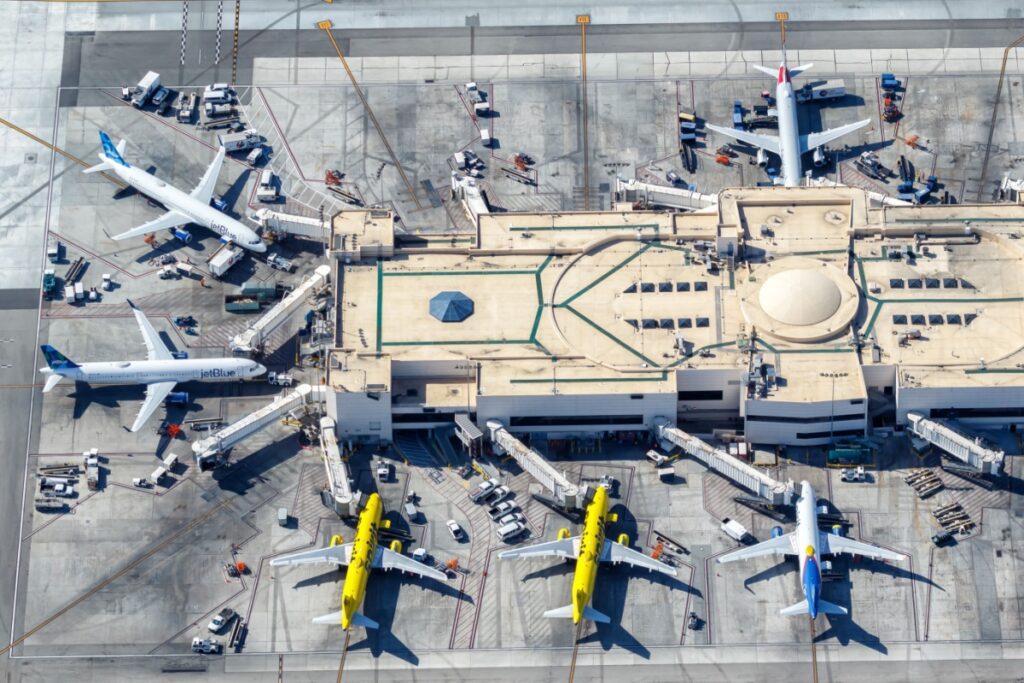The Federal Aviation Administration (FAA) has directed airlines to reduce schedules at about 40 of the nation’s busiest airports as the government shutdown strains air-traffic control. Beginning November 7, 2025, carriers are trimming roughly 4% of flights, with cuts expected to deepen to 10% by November 14 if staffing pressures persist. The FAA says the phased reductions are meant to maintain safety amid controller shortages and training freezes. On the first day alone, major U.S. airlines canceled hundreds of flights, and executives warned disruption could broaden if the shutdown continues.
Why Flights Are Being Cut
Initial schedule changes have centered on large connecting hubs, including Chicago O’Hare, Atlanta, Los Angeles, Newark, and San Francisco, where airlines are prioritizing long-haul and hub-to-hub routes while thinning frequencies on shorter domestic segments. Carriers such as American, Delta, Southwest, and United have focused on reaccommodating affected passengers and consolidating flights to protect overall capacity. Local reports in California, for example, note rolling reductions at SFO and LAX as operations scale down.
What Airlines Must Provide
If your flight is canceled and you choose not to travel, U.S. rules entitle you to a cash refund of the unused ticket and any related fees (e.g., seat selection, baggage) tied to that flight—regardless of the reason for the cancellation. If your flight is significantly delayed or the schedule is significantly changed, you may likewise seek a refund if you decline the revised itinerary. These baseline protections come from the Department of Transportation (DOT) and apply even when the disruption is not the airline’s fault.
However, it’s crucial to separate refund rights from amenities. Because these cancellations stem from FAA-mandated cuts during a shutdown, airlines generally are not required to provide hotel rooms, meal vouchers, or ground transportation for overnight delays. Some carriers may still offer goodwill assistance, but such benefits are discretionary and vary by airline and situation. Consumer guidance outlets and travel editors are advising passengers to lean on insurance protections for out-of-pocket costs that airlines are unlikely to cover during the FAA capacity reductions.
Recent rulemaking and guidance have also strengthened refund transparency and access, clarifying that cash refunds, not just credits, are owed for cancellations and for qualifying significant delays. Travelers should review their carrier’s posted policies and the DOT summary before deciding whether to accept rebooking or to seek a refund.
The Role of Credit Cards and Insurance
If you purchased your trip with a card that includes trip delay or trip cancellation/interruption coverage, those benefits can pay for what airlines don’t, typically lodging, meals, and local transport after a covered delay threshold (often 6–12 hours or overnight). Many premium cards also cover taxes and fees on award tickets, though eligibility rules differ by issuer. Critically, these protections can apply when the disruption is outside the airline’s control, which is why they are particularly relevant during FAA-driven cuts tied to a shutdown.
Standalone travel insurance offers similar safeguards and may include missed-connection coverage if a delay causes you to misconnect to a later flight or cruise. For any claim, keep meticulous documentation: airline emails or app notices showing the cancellation or capacity reduction, receipts for meals and lodging, and your itinerary changes. File promptly through your card issuer’s or insurer’s portal and follow their checklist to avoid processing delays. Travel editors recommend taking screenshots that reference the FAA directive or shutdown-related capacity constraints, which can help establish the cause when you submit a claim.
Practical Steps for Travelers
lIf your flight is canceled, confirm options with the airline and card issuer. Request a cash refund if the trip is no longer viable; otherwise, ask the airline to rebook you on the next available flight. Build buffer time, favor non-stop, early-morning flights, and consider carry-on-only for Thanksgiving travel. Maximize protections by using a card with strong delay coverage, saving your benefit guide, and bookmarking travel alert and claims pages. Proactively line up hotels and transport for significant delays, saving all receipts. Be aware of FAA cuts (4-10% at affected airports) and monitor your flight and departure airport status via airline apps.


